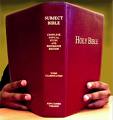 The three-year Lectionary that many Catholics and Protestants hear in public worship gives us a great variety of Holy Scripture.
The three-year Lectionary that many Catholics and Protestants hear in public worship gives us a great variety of Holy Scripture.
Yet, it doesn’t tell the whole story.
My series Forbidden Bible Verses — ones the Lectionary editors and their clergy omit — examines the passages we do not hear in church. These missing verses are also Essential Bible Verses, ones we should study with care and attention. Often, we find that they carry difficult messages and warnings.
Today’s reading is from the English Standard Version Anglicised (ESVUK) with commentary by Matthew Henry.
The death of Abraham
25 Abraham had taken another wife, whose name was Keturah. 2 She bore him Zimran, Jokshan, Medan, Midian, Ishbak and Shuah. 3 Jokshan was the father of Sheba and Dedan; the descendants of Dedan were the Ashurites, the Letushites and the Leummites. 4 The sons of Midian were Ephah, Epher, Hanok, Abida and Eldaah. All these were descendants of Keturah.
5 Abraham left everything he owned to Isaac. 6 But while he was still living, he gave gifts to the sons of his concubines and sent them away from his son Isaac to the land of the east.
—————————————————————————————————————————————–
Last week’s post discussed Shem’s family line all the way to Abram, whom God renamed Abraham.
Now we come to the final years of Abraham, our father in faith, who was completely obedient to God.
Abraham took another wife, Keturah (verse 1) following Sarah’s death (Genesis 23:1-2):
23 Sarah lived to be a hundred and twenty-seven years old. 2 She died at Kiriath Arba (that is, Hebron) in the land of Canaan, and Abraham went to mourn for Sarah and to weep over her.
Matthew Henry explains why (emphases mine):
He had buried Sarah and married Isaac, the two dear companions of his life, and was now solitary. He wanted a nurse, his family wanted a governess, and it was not good for him to be thus alone. He therefore marries Keturah, probably the chief of his maid-servants, born in his house or bought with money. Marriage is not forbidden to old age.
Keturah bore Abraham six sons: Zimran, Jokshan, Medan, Midian, Ishbak and Shuah (verse 2).
Henry posits that this was further evidence of the promise God made to Abraham of numerous descendants for generation after generation:
… the great increase of his posterity was in part fulfilled, which, it is likely, he had an eye to this marriage. The strength he received by the promise still remained in him, to show how much the virtue of the promise exceeds the power of nature.
Jokshan’s sons were Sheba and Dedan; Dedan’s descendants were the Ashurites, the Letushites and the Leummites (verse 3).
Midian’s sons were Ephah, Epher, Hanok, Abida and Eldaah; all these were descendants of Keturah (verse 4).
Abraham left everything he owned to Isaac (verse 5), his son by Sarah.
While he was still alive, he gave gifts to his sons by his concubines and sent them away from Isaac to the land of the east (verse 6).
Henry tells us why Abraham’s was a fatherly model to follow:
After the birth of these sons, he set his house in order, with prudence and justice. 1. He made Isaac his heir, as he was bound to do, in justice to Sarah his first and principal wife, and to Rebekah who married Isaac upon the assurance of it, ch. 24 36. In this all, which he settled upon Isaac, are perhaps included the promise of the land of Canaan, and the entail of the covenant. Or, God having already made him the heir of the promise, Abraham therefore made him heir of his estate. Our affection and gifts should attend God’s. 2. He gave portions to the rest of his children, both to Ishmael, though at first he was sent empty away, and to his sons by Keturah. It was justice to provide for them; parents that do not imitate him in this are worse than infidels. It was prudence to settle them in places distant from Isaac, that they might not pretend to divide the inheritance with him, nor be in any way a care or expense to him. Observe, He did this while he yet lived, lest it should not be done, or not so well done, afterwards. Note, In many cases it is wisdom for men to make their own hands their executors, and what they find to do to do it while they live, as far as they can. These sons of the concubines were sent into the country that lay east from Canaan, and their posterity were called the children of the east, famous for their numbers, Judg 6 5, 33. Their great increase was the fruit of the promise made to Abraham, that God would multiply his seed. God, in dispensing his blessings, does as Abraham did; common blessings he gives to the children of this world, as to the sons of the bond-woman, but covenant-blessings he reserves for the heirs of promise. All that he has is theirs, for they are his Isaacs, from whom the rest shall be for ever separated.
Next week, we find out what happened to Isaac after Abraham’s death.
Next time — Genesis 26:6-11





1 comment
Comments feed for this article
May 21, 2024 at 10:03 pm
Forbidden Bible Verses — Genesis 26:6-11 | Churchmouse Campanologist
[…] Last week’s post looked at Abraham’s second marriage after Sarah died. His second wife, Keturah, bore him several sons and from them, more descendants, further fulfilling God’s promise that his family line would be plentiful. While he was still alive, Abraham left everything he owned to Isaac, his son by Sarah, but also gave gifts to Keturah’s sons. He sent them away to the land of the east, away from Isaac. […]
LikeLike